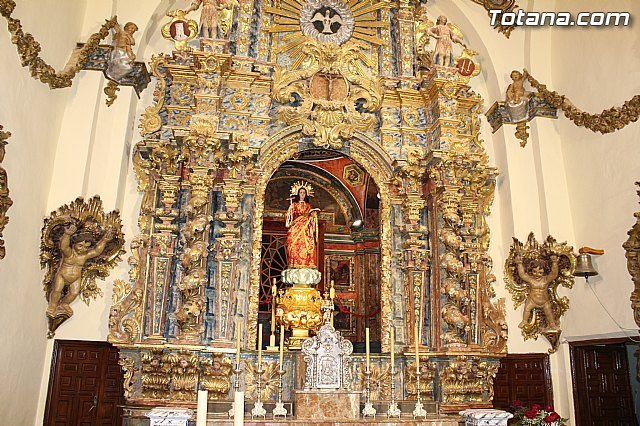The Ministry of Education, Culture and Universities and the City of Totana will rush during the first months of this year restoration Altarpiece of the Sanctuary of Santa Eulalia, one of the actions marked as priority for both institutions on heritage.
Is scheduled for tomorrow Wednesday, the Minister of Education, Culture and Universities, Pedro Antonio Sánchez, and the mayor of the municipality, Isabel Maria Sanchez, attend the festival of Santa Eulalia, which concludes at the Shrine whose altarpiece will be completely recovered an investment of 72,600 euros.
This artwork, dating from the eighteenth century and was made by the retablista Jerome Caballero, is declared a Cultural matter of monument by the Ministry of Culture and every year is visited by thousands of people, especially coinciding with the pilgrimage, where it is expected to involve more than 20,000 people.
This altarpiece is one of the few coffered pair and knuckle that still remain in the region of Murcia and part of the cultural heritage as one of the most outstanding works of the eighteenth century.
The aforementioned altarpiece is made of carved wood, polychrome and gilded pine water and impresses with its mouth accessing the dressing room on the first framed by Solomonic columns and pilasters body.
A second body shot is chaired by the dove of the Holy Spirit framed by pilasters and stipes and figures of angels young men carrying shields Aledo and Totana.
Argárico site of La Bastida
On the other hand, the Ministry of Culture allocated another 32,000 euros to bring one of the annexes to argárico site of La Bastida to host and publicize it, another priority actions agreed between the Ministry and the Consistory property.
The objective of this investment is to present the results of investigations and excavations that have been made since the discovery of the site in the nineteenth century, as well as highlighting the importance with which he told La Bastida in argárica society.
Furthermore, this investment will lay the foundation for the creation of a research center on Mediterranean prehistory and, in parallel, a museum based initiative and diffusion in the reservoir itself.
La Bastida is one of the most important archaeological sites of European prehistory.
It was inhabited some 4,000 years ago in the Bronze Age Argar, and the richness and variety of the findings in the field have attracted researchers from around the world.


